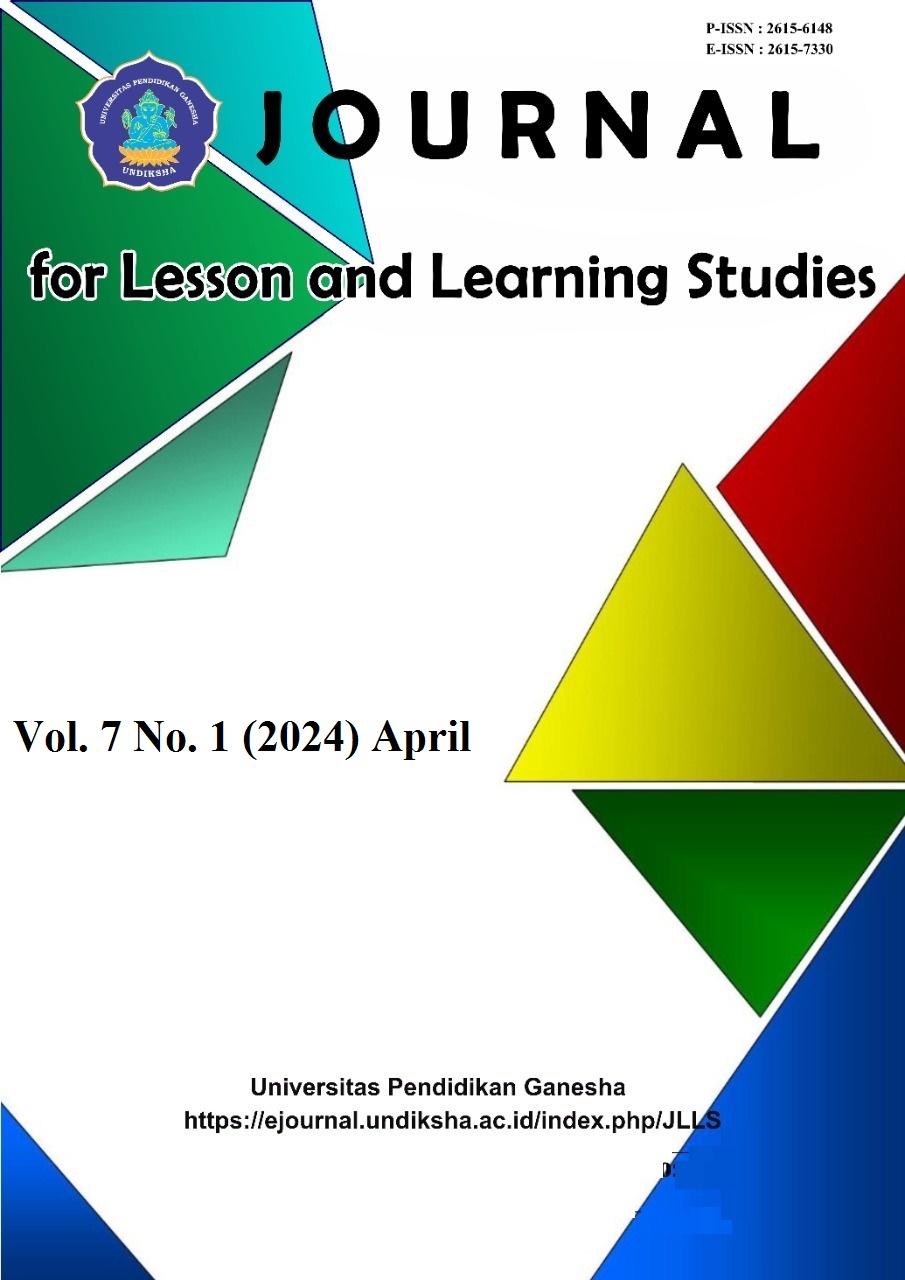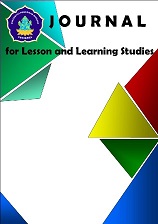Google Classroom-Based Literacy Training E-Modules to Improve Teachers' Ability to Implement the School Literacy Movement
DOI:
https://doi.org/10.23887/jlls.v7i1.70571Keywords:
GLS, E- Modul, Google ClassroomAbstract
Effective management of the School Literacy Movement (GLS) can create a literate culture of school members and improve students' literacy skills. However, in reality, the implementation of GLS in schools cannot be carried out according to the objectives of GLS because of the obstacles faced by teachers. One of them is that teachers do not understand the stages and technical implementation of GLS well. This development research aims to develop a Google Classroom-based GLS management training module for junior high school teachers. This type of research is Research and Development (RND) research using the ADDIE model approach. The subjects in this study consisted of material expert validators, ICT experts, principals and teachers. Data collection techniques were carried out using interviews, observations, documentation studies, questionnaires and tests. Data analysis techniques were carried out using mixed methods. Qualitative data was analyzed using the Milles and Huberman model and quantitative data was analyzed using descriptive quantitative and T-test. The product of this research is the Google Classroom-based literacy training E-module. The results of product testing by expert validation and prospective users in the module product trial were in the category of feasible and effective for use in GLS management training. Through this training module, it is expected that teachers can learn and utilize it as a guide in carrying out GLS activities that are more varied and have an impact on improving students' literacy competencies.
References
Alfitriani, A., & Hutabri, E. (2017). Kepraktisan dan Keefektifan Modul. In Jurnal Kependidikan (Vol. 1, Issue 1, pp. 12–23). https://www.researchgate.net/profile/Adlia-Alfiriani. DOI: https://doi.org/10.21831/jk.v1i1.10896
Alimin, F. G. (2019). The Effectiveness Of Google Classroom As An Instructional Media : A Case Of State Islamic Institute Kendari , Indonesia. March. https://doi.org/10.18510/hssr.2019.7227. DOI: https://doi.org/10.18510/hssr.2019.7227
Anhusadar, L. O. (2016). Kreativitas Pendidikan Di Lembaga PAUD. Jurnal Al-Ta’dib, 9(1), 76–93. https://ejournal.iainkendari.ac.id/al-tadib/article/view/503.
Antara, I. G. W. S., Suma, K., & Parmiti, D. P. (2022). E-Scrapbook: Konstruksi Media Pembelajaran Digital Bermuatan Soal-soal Higher Order Thinking Skills. Jurnal Edutech Undiksha, 10(1), 11–20. https://doi.org/10.23887/jeu.v10i1.47559.
Bano, V. O. (2018). Development of Authentic Assessment Management Training Module for Middle School Science Teachers. Kelola: Jurnal Manajemen Pendidikan, 5(2), 139–151. https://doi.org/10.24246/j.jk.2018.v5.i2.p139-151. DOI: https://doi.org/10.24246/j.jk.2018.v5.i2.p139-151
Bungsu, A. P., & Dafit, F. (2021). Pelaksanaan Literasi Membaca di Sekolah Dasar. Jurnal Pedagogi Dan Pembelajaran, 4(3), 522–527. https://doi.org/https://doi.org/10.23887/jp2.v4i3.40796. DOI: https://doi.org/10.23887/jp2.v4i3.40796
Dewi, R., Mulyati, Y., Rahmat, J., Sari, E. N., & Dalima, P. (2021). Manajemen Pembelajaran Daring/Online Dengan Menggunakan Google Classroom Di SDIT Fajar, Depok. Journal of Mountain Agriculture on the Balkans, 1(1), 47–52. https://doi.org/10.32493/jmab.v1i1.10373. DOI: https://doi.org/10.32493/jmab.v1i1.10373
Dewi, W. S., Karma, I. N., & Oktaviyanti, I. (2022). Implementasi Program Gerakan Literasi Sekolah (GLS) Pada Literasi Baca Tulis di SDN 30 Ampenan Tahun Ajaran 2022/2023. Jurnal Ilmiah Profesi Pendidikan, 7(4), 2165–2172. https://doi.org/10.29303/jipp.v7i4.931. DOI: https://doi.org/10.29303/jipp.v7i4.931
Gunansyah, G., Rachmadiyanti, P., & Subagiyo, F. M. (2018). Keterampilan Informasi Melalui Pembuatan Media Literasi. Publikasi Pendidikan, 8(1), 13. https://doi.org/10.26858/publikan.v8i1.4928. DOI: https://doi.org/10.26858/publikan.v8i1.4928
Ichsan, A. S. (2018). Gerakan Literasi Sekolah Di Sekolah Islam (Sebuah Analisis Implementasi Gls Di Mi Muhammadiyah Gunungkidul). Al-Bidayah: Jurnal Pendidikan Dasar Islam, 10(1), 69–88. https://doi.org/10.14421/al-bidayah.v10i1.189. DOI: https://doi.org/10.14421/al-bidayah.v10i1.189
Ilmi, N., Wulan, N. S., & Wahyudin, D. (2021). Gerakan Literasi Sekolah dalam Meningkatkan Minat Baca Siswa Sekolah Dasar. Edukatif: Jurnal Ilmu Pendidikan, 3(5), 2866–2873. https://doi.org/10.31004/edukatif.v3i5.990. DOI: https://doi.org/10.31004/edukatif.v3i5.990
Iskandar, D., Zuwerni, Z., & Sofyan, S. (2022). Pengembangan E-Modul Pelatihan aplikasi Google Workspace For Education Untuk Penguatan Kompetensi Literasi Digital Guru MTs. Jurnal Manajemen Pendidikan Dan Ilmu Sosial, 3(2), 1005–1018. https://doi.org/10.38035/jmpis.v3i2.1268. DOI: https://doi.org/10.38035/jmpis.v3i2.1268
Kurniawan, B., & Purnomo, A. (2020). Pelatihan Penggunaan Aplikasi Google Classroom Sebagai Upaya Peningkatan Pembelajaran Online Bagi Guru Matapelajaran IPS. International Journal of Community Service Learning, 4(1), 1–9. https://doi.org/10.23887/ijcsl.v4i1.22236. DOI: https://doi.org/10.23887/ijcsl.v4i1.22236
Lestari, F. D., Ibrahim, M., Ghufron, S., & Mariati, P. (2021). Pengaruh Budaya Literasi terhadap Hasil Belajar IPA di Sekolah Dasar. Jurnal Basicedu, 5(6), 5087–5099. https://doi.org/10.31004/basicedu.v5i6.1436. DOI: https://doi.org/10.31004/basicedu.v5i6.1436
Liansari, V., Taufiq, W., & Santoso, D. R. (2021). The Implementation of Literacy Culture Programs in Elementary School. Jo-ELT (Journal of English Language Teaching) Fakultas Pendidikan Bahasa & Seni Prodi Pendidikan Bahasa Inggris IKIP, 8(2), 189. https://doi.org/10.33394/jo-elt.v8i2.4481. DOI: https://doi.org/10.33394/jo-elt.v8i2.4481
Marmoah, S., & Poerwanti, Suharno, J. I. S. (2022). Literacy culture management of elementary school in Indonesia. Heliyon, 8(4), e09315. https://doi.org/10.1016/j.heliyon.2022.e09315. DOI: https://doi.org/10.1016/j.heliyon.2022.e09315
Melvinasari, S. (2019). Design of mathematics module based on rme to improving the problem-solving ability. International Journal of Scientific and Technology Research, 01, 3918–3922. https://doi.org/10.31764/jtam.v7i1.10185.
Nurul Fauziah, S., Nur Faziah, S., Sulaehatun Nupus, F., & Ulfi, N. (2020). Evaluasi Minat Baca Siswa Melalui Program Literasi Sekolah. Jurnal Pendidikan Dan Ilmu Sosial, 2(1), 108–116. https://ejournal.stitpn.ac.id/index.php/nusantara/article/view/641.
Ozdamli, F., & Ozdal, H. (2018). Developing an instructional design for the design of infographics and the evaluation of infographic usage in teaching based on teacher and student opinions. Eurasia Journal of Mathematics, Science and Technology Education, 14(4), 1197–1219. https://doi.org/10.29333/ejmste/81868. DOI: https://doi.org/10.29333/ejmste/81868
Ramandanu, F. (2019). Gerakan Literasi Sekolah (GLS) Melalui Pemanfaatan Sudut Baca Kelas Sebagai Sarana Alternatif Penumbuhan Minat Baca Siswa. Jurnal Mimbar Ilmu, 24(1), 10–19. https://doi.org/https://doi.org/10.23887/mi.v24i1.17405. DOI: https://doi.org/10.23887/mi.v24i1.17405
Ratama, I. P., Padmadewi, N. N., & Artini, L. P. (2021). Teaching the 21st Century Skills (4Cs) in English Literacy Activities. Journal of Education Research and Evaluation, 5(2), 223. https://doi.org/10.23887/jere.v5i2.30849. DOI: https://doi.org/10.23887/jere.v5i2.30849
Sari, D. P., Sukmawati, R. A., Purba, H. S., Maulana, D., & Azis, H. (2019). Pelatihan Penggunaan Google Classroom untuk Mengoptimalkan Proses Pembelajaran. Jurnal Pengabdian Masyarakat, 1(2), 56–60. http://download.garuda.kemdikbud.go.id/article.php?article. DOI: https://doi.org/10.20527/btjpm.v1i2.1785
Saryadi, W., & Sulisworo, D. (2023). Development of E-Module Based on the Discovery Learning to Improve the Student Creative Thinking Skills. JTAM (Jurnal Teori Dan Aplikasi Matematika), 7(1), 11–22. https://doi.org/10.31764/jtam.v7i1.10185. DOI: https://doi.org/10.31764/jtam.v7i1.10185
Sitorus, D. S., Siswandari, & Kristiani. (2019). The effectiveness of accounting E-module integrated with character value to improve students’ learning outcomes and honesty. Cakrawala Pendidikan, 38(1), 120–129. https://doi.org/10.21831/cp.v38i1.20878. DOI: https://doi.org/10.21831/cp.v38i1.20878
Sofyan, H., Anggereini, E., & Saadiah, J. (2019). Development of E-Modules Based on Local Wisdom in Central Learning Model at Kindergartens in Jambi City. European Journal of Educational Research, 8(4), 1137–1143. https://doi.org/10.12973/eu-jer.8.4.1137. DOI: https://doi.org/10.12973/eu-jer.8.4.1139
Srirahayu, D. P., Kusumaningtiyas, T., & Harisanty, D. (2021). The Role of the School Librarian toward the Implementation of the School Literacy Movement (Gerakan Literasi Sekolah) in East Java. Library Philosophy and Practice, 1–15. https://search.proquest.com/openview/3867add817b3.
Sudianto, S., & Kisno, K. (2021). Potret kesiapan guru sekolah dasar dan manajemen sekolah dalam menghadapi asesmen nasional. Jurnal Akuntabilitas Manajemen Pendidikan, 9(1). https://doi.org/10.21831/jamp.v9i1.39260. DOI: https://doi.org/10.21831/jamp.v9i1.39260
Sugiyono, P. (2017). Metode Penelitian dan Pengembangan (Research and Development). CV. ALFABETA.
Sukarman, Rahayu, W., & Hakim, L. El. (2021). The Effectiveness of Mathematics E-Modules with a Contextual Approach on Geometry Matters to Improving Students’ Learning Outcomes. Jurnal Pendidikan Indonesia (JPI), 10(2), 362–369. https://doi.org/10.23887/jpi-undiksha.v10i2.33530.
Sułkowski, Ł., Kolasińska-Morawska, K., Seliga, R., & Morawski, P. (2021). Smart learning technologization in the economy 5.0—the polish perspective. Applied Sciences (Switzerland), 11(11). https://doi.org/10.3390/app11115261. DOI: https://doi.org/10.3390/app11115261
Suryaningtyas, A., Kimianti, F., & Prasetyo, Z. K. (2020). Developing Science Electronic Module Based on Problem-Based Learning and Guided Discovery Learning to Increase Critical Thinking and Problem-Solving Skills. 401(Iceri 2019), 65–70. https://doi.org/10.2991/assehr.k.200204.013. DOI: https://doi.org/10.2991/assehr.k.200204.013
Syahroni, M., Dianastiti, F. E., & Firmadani, F. (2020). Pelatihan Media Pembelajaran Berbasis Teknologi Informasi untuk Meningkatkan Keterampilan Guru dalam Pembelajaran Jarak Jauh. International Journal Of Community Service Learning, 4(3), 171–172. https://doi.org/10.23887/ijcsl.v4i3.2884. DOI: https://doi.org/10.23887/ijcsl.v4i3.28847
Tanjung, R. E., & Faiza, D. (2019). Canva Sebagai Media Pembelajaran Pada Mata Pelajaran Dasar Listrik Dan Elektronika. Voteteknika (Vocational Teknik Elektronika Dan Informatika), 7(2), 79. https://doi.org/10.24036/voteteknika.v7i2.104261. DOI: https://doi.org/10.24036/voteteknika.v7i2.104261
Trianggoro, I. R. W., & Koeswanti, H. D. (2021). Evaluasi Program Gerakan Literasi Sekolah (Gelis) Di Sekolah Dasar. Jurnal Ilmiah Pendidikan Profesi Guru, 4(3), 355–362. https://doi.org/10.23887/jippg.v4i3.40629. DOI: https://doi.org/10.23887/jippg.v4i3.40629
Trust, T., & Pektas, E. (2018). Using the ADDIE Model and Universal Design for Learning Principles to Develop an Open Online Course for Teacher Professional Development. Journal of Digital Learning in Teacher Education, 34(4), 219–233. https://doi.org/10.1080/21532974.2018.1494521. DOI: https://doi.org/10.1080/21532974.2018.1494521
Wakhinuddin S, A. (2020). Global Conferences Series : The Effect of Skill Training in Improving Teachers Competency to Made-Teacher Test Base on HOTS. 5, 140–143.
Williams, M. K., Foulger, T. S., & Wetzel, K. (2009). Preparing Preservice Teachers for 21st Century Classrooms: Transforming Attitudes and Behaviors About Innovative Technology. Journal of Technology and Teacher Education, 17(3), 393–418. https://www.learntechlib.org/primary/p/28216.
Xiao, Y., Surasin, J., & Prabjandee, D. (2020). Development of a Training Module to Improve Initial ELT Proficiency Among Student-Teachers in Multi-Ethnic Community Schools. Journal of Language and Linguistic Studies, 16(1), 366–389. https://doi.org/10.17263/JLLS.712849. DOI: https://doi.org/10.17263/jlls.712849
Yanuarti, R., Utari, I., & Harianti, D. (2022). Evaluation of E-Module Utilization as Self-directed Learning Materials in Teachers’ Competency Improvement Program. Jurnal TEKNODIK, 26(2), 101–114. DOI: https://doi.org/10.32550/teknodik.vi.972
Yulando, S., Chi, T. F., Mesin, T., & Yogyakarta, U. N. (2019). Electronic Modul Designe: Interactive Learning. 7(10), 694–698. https://doi.org/10.12691/pendidikan-7-10-4.
Yulando, S., Sutopo, S., & Franklin Chi, T. (2019). Electronic Module Design and Development: An Interactive Learning. American Journal of Educational Research, 7(10), 694–698. https://doi.org/10.12691/education-7-10-4. DOI: https://doi.org/10.12691/education-7-10-4
Yunita Anindya, E. F., Suneki, S., & Purnamasari, V. (2019). Analisis Gerakan Literasi Sekolah Pada Pembelajaran Tematik. Jurnal Ilmiah Sekolah Dasar, 3(2), 238. https://doi.org/10.23887/jisd.v3i2.18053. DOI: https://doi.org/10.23887/jisd.v3i2.18053
Zaenab, S., Chamisijatin, L., & Wahyuni, S. (2020). Strengthening character education through literacy movement at Muhammadiyah junior high schol. Journal of Community Service and Empowerment, 1(1), 54–63. https://doi.org/10.22219/jcse.v1i1.11516. DOI: https://doi.org/10.22219/jcse.v1i1.11516
Downloads
Published
How to Cite
Issue
Section
License
Copyright (c) 2024 Fransina Hikinda, Sophia Tri Satyawati, Marinu Waruwu

This work is licensed under a Creative Commons Attribution-ShareAlike 4.0 International License.
Authors who publish with the Journal for Lesson and Learning Studies agree to the following terms:
- Authors retain copyright and grant the journal the right of first publication with the work simultaneously licensed under a Creative Commons Attribution License (CC BY-SA 4.0) that allows others to share the work with an acknowledgment of the work's authorship and initial publication in this journal.
- Authors are able to enter into separate, additional contractual arrangements for the non-exclusive distribution of the journal's published version of the work (e.g., post it to an institutional repository or publish it in a book), with an acknowledgment of its initial publication in this journal.
- Authors are permitted and encouraged to post their work online (e.g., in institutional repositories or on their website) prior to and during the submission process, as it can lead to productive exchanges, as well as earlier and greater citation of published work. (See The Effect of Open Access)





